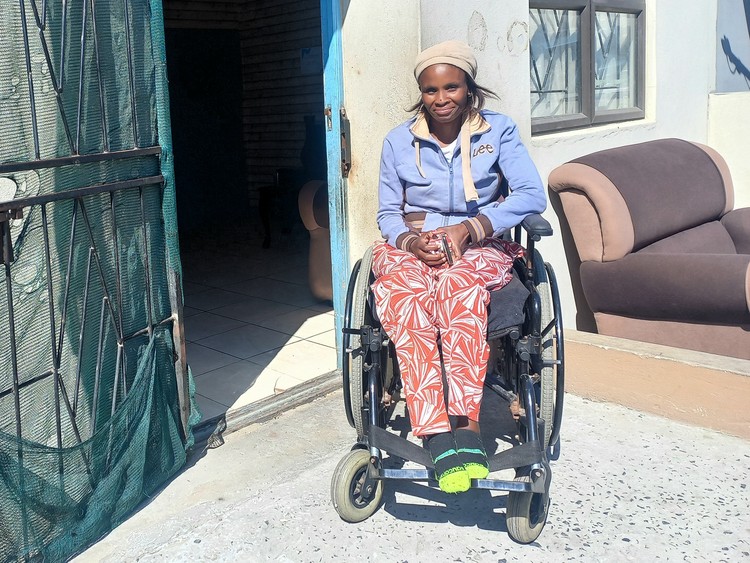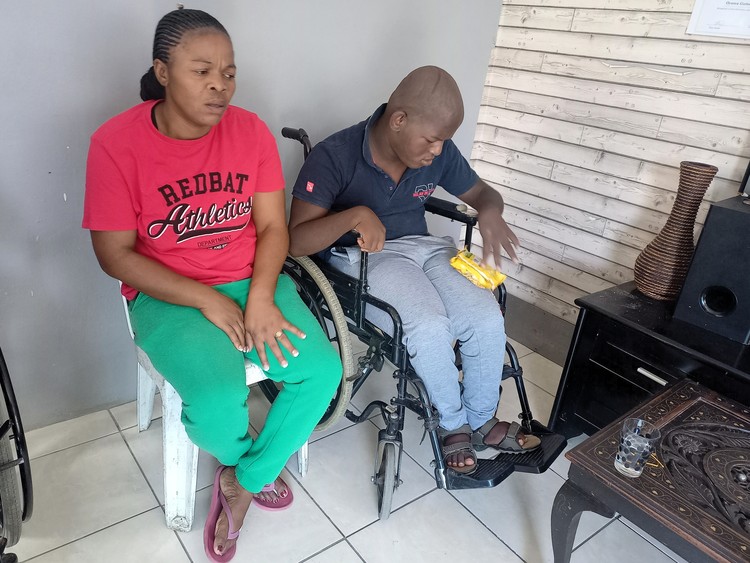We spend R600 out of our R2,180 grant on transport, say disability activists
Eerste River resident Andiswa Gumede says the nearest physiotherapy treatment centre is in Kleinvlei Clinic, which is about 4km away and is costly to travel to. Photos: Marecia Damons
- The Disability Activist Forum in Eerste River, Cape Town, is demanding urgent changes to make healthcare services more accessible to people with disabilities.
- While many of them rely on the disability grant of R2,180, they say it is insufficient for the limited transport options available to travel to health facilities.
- Following a letter sent by the Forum, the health department has identified five points in the Eerste River area to assist patients to collect medications easily.
- Meanwhile, the City of Cape Town says it already has 300 commuters with special needs who use its Dial-a-Ride service daily and a further 2,000 people on an ad-hoc basis.
Eerste River resident Noludwe Zembeta receives a disability grant for her 16-year-old son Phakamani. He was diagnosed with Cerebral Palsy at birth and is fully dependent on his mother who needs a wheelchair to move him around. Zembeta, who is unemployed, spends nearly R1,000 on adult nappies. She uses the remainder of the R2,180 grant for food, transport and clothes.
“That grant doesn’t last. It’s nothing,” she said.
Zembeta said she has to book an Uber for R200 to take Phakamani to the clinic because the minibus taxis are not wheelchair-friendly, and Eerste River is not on the MyCiTi Bus route.
People living with disabilities in Eerste River and their care-givers, like Zembeta, say they’ve been neglected by the government. They have been placed in homes with little to no wheelchair accessibility to public transport, clinics and recreational activities in the area.
These residents, many of whom have to use a wheelchair to get around, recently started the Disability Activist Forum to raise their issues.
“We are lucky and happy that we received formal houses, but the houses we have been given are not close to any clinics, police stations, parks, or community halls. We are far from health facilities, meaning that our health depends on transport, but public transport in Eerste River is almost non-existent,” read the Forum’s letter sent to several local and provincial government departments.
In his budget speech in February, Minister of Finance Enoch Godongwana announced increases to social grants. But the increases are lower than the inflation rate of 5.6% in the year to February.
The disability grant increased this month from R2,090 to R2,180 and will increase by R10 in October. But the Forum says this is not enough to cover their basic needs.
“Our grants are already small, and a big portion— sometimes more than R600 per month— is taken up by the cost of transporting ourselves to healthcare facilities,” the Forum wrote.
Andiswa Gumede has been living in Eerste River since 2015. She previously lived in Philippi where it was easier to visit Lentegeur Hospital for physiotherapy three times a week. But now the nearest treatment centre, Kleinvlei Clinic, is about 4km away and doesn’t offer the same facilities.
Gumede is a single parent and cares for her two children aged 21 and four, as well as her seven-year-old grandson and 15-year-old nephew. The family survives on her disability grant and child support grants.
Among the Forum’s demands is for the provincial Department of Social Development to “urgently” get an accessible public venue in Eerste River where they can socialise, exercise and participate in other community activities.
Department of Social Development spokesperson Esther Lewis said that most of the Forum’s demands fall outside of the department’s mandate, including the provision of a venue in the area.
Lewis said the department’s Disability Programme made contact with the group to assess what type of support they need.
Abulele Dyasi, spokesperson for the provincial Department of Health and Wellness, said the department has identified five collection points within the Eerste River area to assist patients enrolled with the Chronic Dispensing Unit (CDU).
“Eerste River residents can contact Kleinvlei Clinic to determine if they are eligible for this service. Additionally, patients who cannot collect their medicine from the collection points can be linked to contracted Non-Profit Organisations (NPOs), through the Kleinvlei Clinic to arrange for home deliveries,” said Dyasi.
Noludwe Zembeta and her son Phakamani would like more accessible activities for people with disabilities in the area.
Access to public transport
The City provides Dial-A-Ride for people with disabilities who are unable to access mainstream public transport services.
Eerste River resident Ludumo Hlati has been using a wheelchair since 2016 after he was shot. He said the Dial-A-Ride service requires him to book in advance and he has to take an extra R50 along in case he needs to book an Uber.
“Sometimes, you get a Dial-A-Ride to take you to the doctor, but when you’re done it’s difficult to find a ride back home. That’s why it’s better to Uber because at least you know that you will get a ride when you book it,” said Hlati.
Rob Quintas, the Mayco Member for Urban Mobility, said 300 commuters with special needs are approved for Dial-a-Ride to get to and from work daily.
“Another 2,000 commuters with special needs are approved to travel on Dial-a-Ride on an ad-hoc basis, during off-peak times, by booking trips seven days in advance, subject to availability,” said Quintas. These ad-hoc users mostly use Dial-a-Ride to get access to medical services.
He said the Dial-a-Ride service operates with 13 vehicles and is “currently oversubscribed”. “To ensure fairness, new applicants have to be placed on a waiting list until space becomes available,” said Quintas.



